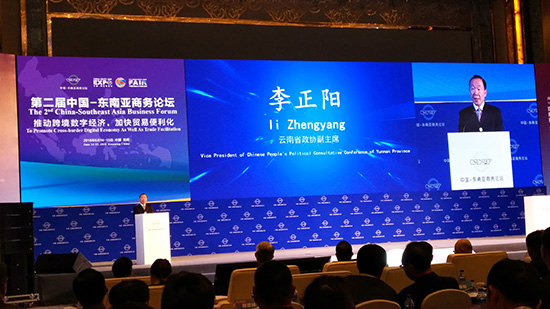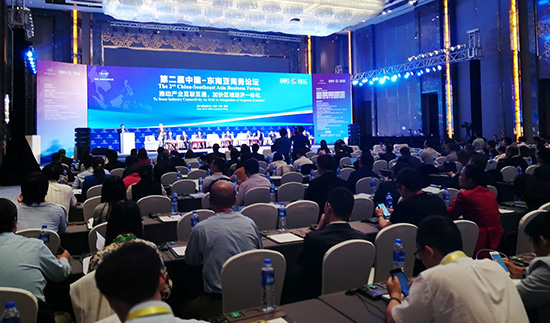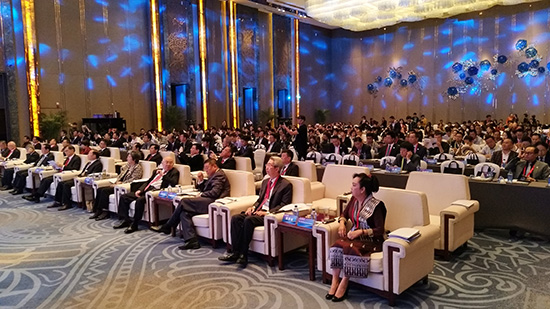On 15 June 2018, co-organized by ASEAN-China Centre (ACC) and the People’s Government of Yunnan Province, the 2nd China-Southeast Asia Business Forum (hereinafter referred to as the 2nd CSEABF) was held successfully in Kunming, Yunnan province. Mr. Li Zhengyang, Vice Chairman of Yunnan Provincial Committee of the CPPCC, Mr. Zhu Weiqun, Standing Committee of the 12thNational Committee of the CPPCC, Mme. Yang Xiuping, Secretary-General of ACC, Dr. Maung Maung Ley, Vice President of Myanmar Chamber of Commerce and Industry, attended the opening of the Forum. Government officials, leaders of business associations and well-known entrepreneurs and the media of China and Southeast Asian countries, with a total number of 500 people were present.

Mr. Li Zhengyang delivered an opening address. He said that the Belt and Road Initiative has made Yunnan an open frontier out of a remote and marginal area and provided Southeast Asian countries a golden opportunity for development. In recent years, Yunnan, with its unique geographical advantages, has carried out closer contacts with Southeast Asian countries in extensive fields and achieved fruitful results. He put forward four proposals for further development of relations between Yunnan and Southeast Asian countries. First, deepening economic and trade cooperation between Yunnan and Southeast Asian countries with focus on green energy, green food and destination for healthy life. Second, speeding up the construction of "five networks”, namely network of road, aviation, energy, water and Internet, to promote connectivity between Yunnan and Southeast Asian countries. Third, improving the level of customs clearance facilitation and mechanism innovation to promote the construction of open platforms such as economic cooperation zones between China and other countries, and to jointly build industrial parks with the Southeast Asian countries. Fourth, promoting exchanges and cooperation between Yunnan and Southeast Asian countries in the fields of culture, medical health, education, science and technology, to further enhance mutual understanding, trust and friendship.

Dr. MaungMaung Ley, Vice President of Myanmar Chamber of Commerce and Industry, on behalf of the Rotating Presidency of the 2ndCSEABF, briefed in his remarks that the friendship between Myanmar and China has a long history. The two countries have common borders and shared vision of development. As an important country in Southeast Asia, Myanmar is experiencing political, economic and cultural transition and plays an active role in the construction of the ASEAN community, the Lancang-Mekong Cooperation and the Bangladesh-China-India-Myanmar Economic Corridor. At present, trade protectionism is on the rise and economic globalization is facing challenges. He called on all countries to strengthen coordination and further deepen practical cooperation in various fields and promote full and harmonious development for the benefit of the people in the region.
Mr. Zhu Weiqun, Standing Committee of the 12th National Committee of the CPPCC, mentioned in his remark that since the Belt and Road Initiative was proposed 5 years ago, the progress has exceeded expectations and the cooperation has yielded fruitful results. He appreciated that Yunnan fully plays its own advantages to participate in the Belt and Road Initiative, carries out cultural exchanges and cooperation in wide range, rich content and diversified forms with other countries in the world, especially in Southeast Asia, and has made positive achievements. He suggested that Yunnan promote unimpeded trade and deepen cooperation with the Southeast Asian countries through people-to-people connection, and jointly develop new blueprint, tackle new challenges and share new achievements.
Mr. Zhao Xiaoyu, President of China Double Green Entrepreneur Council, shared views on industrial connectivity and cross-border financial cooperation between China and Southeast Asian countries in his remark. He believed that actively promoting industrial connectivity between China and Southeast Asian countries and strengthening cross-border financial cooperation will become an important and effective link in the implementation of the Belt and Road. Yunnan is China’s important gateway to Southeast Asia and has unique geographical advantages. Both sides can closely link population, goods, services and capital to make the exchanges and cooperation between countries more flexible. He suggested that Yunnan make full use of its regional advantages and build itself into the center of economy and trade, scientific and technological innovation, financial service and cultural exchange facing the Southeast Asia, so as to make new contributions to further practical cooperation between China and the Southeast Asian countries.
Mr. Liu Guangxi, Chairman of CCPIT Yunnan Sub-council, briefed in his remark the current situation of cross-border economic cooperation and border cooperation between Yunnan and Southeast Asian countries. He said that blessed with geographical proximity and cultural affinity with Southeast Asian countries, Yunnan has unique development advantages. He put forward three suggestions. First, accelerating the construction of cross-border economic cooperation zones and the border cooperation zones, to promote an economic-zone-oriented economy that influences the Southeast Asia. Second, promoting the construction of China (Yunnan) Pilot Free Trade Zone and improving the level of open economy. Third, advancing the development of Yunnan's processing trade and establishing an industrial system which is based on Yunnan and influencing the surrounding areas and driving the transformation and upgrading of traditional industries. He hoped that all the participants would fully exchange and make positive suggestions on the improvement of cooperation between China, especially Yunnan and Southeast Asian countries.
In the subsequent theme forum, Mr. Yang Tianhua, President of ASEAN-China Commerce Association, Mr. Vo Tan Thanh, Vice Chairman of Vietnam Chamber of Commerce & Industry, DaotiLiew Sew Yee, Vice President of the National Chamber of Commerce and Industry of Malaysia, Mme. Chanthachone Vongsay, Vice President of Lao National Chamber of Commerce and Industry, Mr. Alberto Carvalho Araujo, Chamber of Commerce and Industry of Timor-Leste, and Mr. Zhuang Mingdeng, Secretary-General of Philippine Silk Road International Chamber of Commerce made keynote speeches successively. The speakers gave an overview of the current state of their own countries including economic development, investment environment and preferential policies. They encouraged China and Southeast Asian countries to seize the opportunities brought by the Belt and Road Initiative to strengthen exchanges, deepen practical cooperation and achieve mutual benefit and win-win results.

In the afternoon, sub-forums on the themes of “Boost Industry Connectivity and Promote Regional Economic Integration” and “Promote Cross-border Digital Economy and Trade Facilitation” were held. Representatives of Chinese and Southeast Asian business associations, enterprises and academic institutions discussed vigorously on such topics under the Belt and Road Initiative as the new opportunities for China's industrial cooperation with Southeast Asian countries, logistics and information connectivity, the construction of information infrastructure in the age of intelligence, the construction of the cross-border supply chain system, the cross-border integrated information service platform in Southeast Asia, and the legal service mode of the overseas industrial parks. It is agreed that China and the Southeast Asian countries should take the opportunity of the Belt and Road Initiative to develop cross-border economy, promote regional integrated collaboration and connectivity and further strengthen trade and investment cooperation for common development and prosperity.
During the forum, relevant parties signed the Kunming Joint Declaration of the 2nd China-Southeast Asia Business Forum. CCPIT Yunnan Sub-council and CCOIC Yunnan Sub-chamber signed cooperation agreements and action plans with business associations of Lao PDR, Myanmar, Thailand and Vietnam respectively.